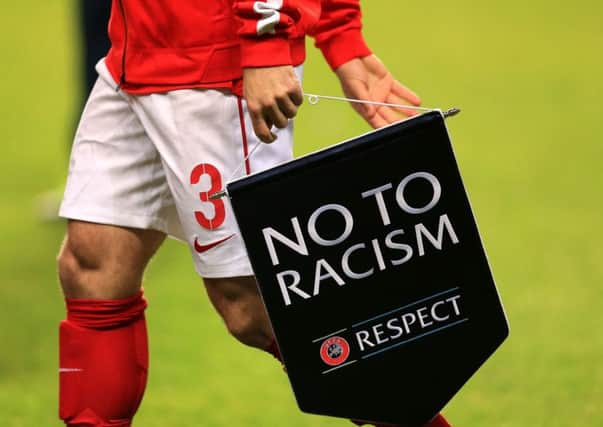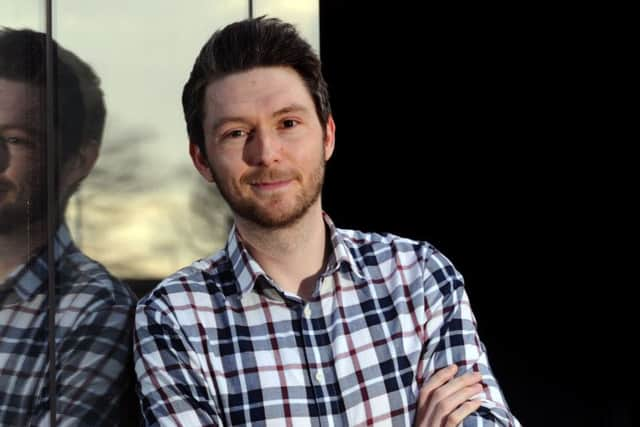Discrimination in sport and why it hasn't gone away


Whether it’s Sir Mo Farah sprinting down the home straight leaving his rivals trailing in his wake, or Nicola Adams outfoxing and outpunching her opponents in the boxing ring, black men and women have become some of our most popular and revered sporting stars.
It’s perhaps hard to believe then that less than 30 years ago the sound of monkey chants echoing around football grounds and the sight of fans hurling bananas at a black player were commonplace.
Advertisement
Hide AdAdvertisement
Hide AdThankfully such vile and repugnant behaviour has disappeared from stadiums and arenas and these days we celebrate the achievements of our sporting heroes and heroines irrespective of their skin colour, gender, or whether they’re gay, straight or bisexual.


You could almost be forgiven for thinking that the battle against discrimination in sport has already been won and that a level playing field now exists for everyone. But you would be wrong.
According to figures from Brandwatch, a leading social media analytics company, more than 134,000 discriminatory posts were directed at Premier League teams and players over the course of last season, while anti-discrimination organisation Kick It Out has said it is seeing “incidents of hate” in football every week.
And it doesn’t stop there. A study by Leeds Beckett University published last month found that sporting organisations in the UK were ignoring issues of racial inequality in coaching, and only this week a report by the Commons Culture, Media and Sport Committee warned that sport isn’t doing enough to tackle homophobic abuse.
Advertisement
Hide AdAdvertisement
Hide AdNow a new book, Sport and Discrimination, has put racism, sexism and homophobia under the microscope. The academic book, co-edited by Dr Daniel Kilvington - Senior Lecturer in Media and Cultural Studies at Leeds Beckett, draws on the views of academics as well as campaign groups working on the frontline in the battle against discrimination in sport.


Dr Kilvington says for all the giant strides made in recent decades discrimination remains “massively” widespread. “It takes place in various forms and various places. For example, these days we hear that racism in football is not as bad as it used to be because overt racism on the terraces and in the stands is decreasing.
“Fewer and fewer fans are getting arrested for racist chanting, but racism is very clever and so is discrimination and it can operate in subtle ways. What we’re seeing now in football, for instance, is overt racism has migrated from the stands to social media,” he says.
“Racism, sexism and homophobia still exist, they’re just operating under the surface. Discrimination is institutional and it’s invisible but that doesn’t mean it’s not there and that’s why it’s important that we raise awareness.”
Advertisement
Hide AdAdvertisement
Hide AdThe book examines issues such as the alarming rise of racism on social media and the under-representation of black, Hispanic and Asian coaches.
Discrimination isn’t just confined to football and the book also covers a wide range of sports including cricket, climbing and athletics not just in the UK, but around the world.
So how does the UK rank in the fight against discrimination? “Campaign groups like Kick It Out are leading the way in terms of challenging these forms of discrimination but they are still there and they are embedded.”
Dr Kilvington says the nature of discrimination in different sports varies around the world. He points to Australian Rules Football which is the focus of one chapter that claims Aboriginal players still face the kind of racism not seen in England for decades.
Advertisement
Hide AdAdvertisement
Hide Ad“It seems to be at a level where we were 25 years ago in terms of their treatment of Aboriginal players. It’s quite alarming because we don’t really see that these days in English football, cricket, or rugby.”
When it comes to dealing with homophobia Dr Kilvington believes there are some encouraging signs. “There’s a lot of research that suggests the attitude towards gay athletes is quite welcoming and inclusive and there’s not much hostility these days.
“On the flip side there are others that don’t share this opinion. Stonewall and other organisations have put forward statistics saying it is still a major problem.”
Discrimination isn’t confined to racism and homophobia, sexism is an issue too, and Dr Kilvington says this can be both implicit and explicit. “There are numerous examples discussed in the book like that of Eugenie Bouchard who was asked to twirl in front of the stadium at the Australian Open by one of the organisers.
Advertisement
Hide AdAdvertisement
Hide Ad“You wouldn’t get a male tennis player being asked to twirl or flex his biceps and it goes back to the idea that female candidates are seen as eye candy rather than serious athletes.”
In 2015, the FA was criticised for sending out a ‘sexist’ tweet which, after praising the England women’s team following their World Cup heroics, said they could now go back to being “mothers, partners and daughters”.
“It’s that idea that female athletes tend not to be considered true athletes, they’re a woman first and then an athlete. Whereas men aren’t portrayed like that. It’s quite subtle, but only once you recognise it can you start to challenge it.”
British cycling has also found itself accused of sexism with former Olympic and world road race champion Nicole Cooke telling a panel of MPs that cycling is a sport “run by men, for men”.
Advertisement
Hide AdAdvertisement
Hide AdDr Kilvington says that discrimination in whatever guise it takes has changed and he points out that one of the worrying trends has been the rise of so-called ‘banter.’ “This cuts across all sport. There’s this idea that it’s not really racist or sexist, it’s just a bit of banter. But this banter does have a huge effect and it is discriminatory.”
Dr Kilvington is under no illusion about the scale of discrimination in sport. “It’s perhaps just as bad but we can’t see it and because we can’t see it people either tend to ignore it or believe we’ve just beaten it. It’s true that overt discrimination in a sporting context is decreasing year by year but that’s because social norms have changed.
“But it hasn’t gone away. It’s still there online, it’s still there behind the scenes institutionally, it’s there in management decisions and it’s almost harder to challenge now.”
Which means more work has to be done. “Kick It Out is challenging hate speech on social media and wants to see guidelines drawn up for clubs on how to tackle discrimination and what punishment should be handed out to fans.
Advertisement
Hide AdAdvertisement
Hide Ad“We also need sport to become more diverse at the top, we need more diversity in coaching in the sporting world and we need greater education amongst fans.”
Sport must tackle homophobia
For all the progress that has been made in recent years there are still no openly gay professional male players in British football.
A new report published by the Commons Culture, Media and Sport Committee this week said that attitudes in sport are out of step with society. It also said that not enough was being done to tackle homophobic abuse and called on authorities to impose lengthy bans on offenders.
The committee’s chairman Damian Collins said: “From the evidence we have received in this inquiry, we believe there are many gay athletes who have not come out, because they are frightened of the impact this decision will have on their careers, and the lives of the people they love. That is not acceptable and should not be tolerated.”